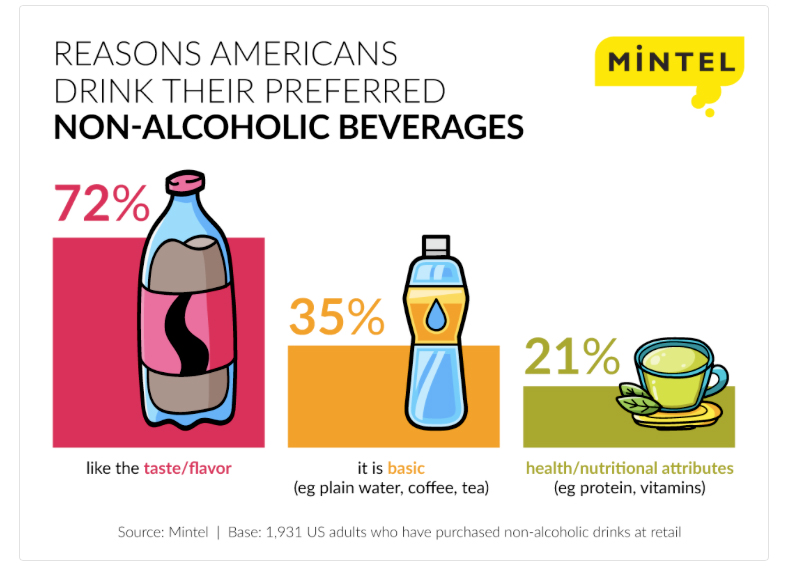67 % of Americans Sometimes Or Frequently Purchase New/Different Beverages
While America’s non-alcoholic beverage market is shifting in favour of better-for-you alternatives, new research from Mintel reveals that…
 While America’s non-alcoholic beverage market is shifting in favour of better-for-you alternatives, new research from Mintel reveals that taste/flavour (72 percent) is by far the main influencer for consumers when drinking preferred beverages, with health/nutritional attributes (21 percent) and functional attributes (16 percent) far less influential. Today, cross-category beverages* are becoming increasingly more available as brands attempt to cater to consumers’ better-for-you demands while also delivering innovative new flavour options.
While America’s non-alcoholic beverage market is shifting in favour of better-for-you alternatives, new research from Mintel reveals that taste/flavour (72 percent) is by far the main influencer for consumers when drinking preferred beverages, with health/nutritional attributes (21 percent) and functional attributes (16 percent) far less influential. Today, cross-category beverages* are becoming increasingly more available as brands attempt to cater to consumers’ better-for-you demands while also delivering innovative new flavour options.
The top three categories of non-alcoholic beverages saw stagnant or declining sales from 2014-2015, with carbonated soft drinks (CSDs) (0.1 percent growth), juice (0.1 percent growth) and dairy milk (7 percent decline) suffering the most. This comes as trending beverage categories, including energy drinks (8.9 percent growth) and coffee (8.7 percent growth), experienced strong sales growth.
Although the majority of consumers drink juice (66 percent), CSDs (64 percent) and dairy milk (64 percent), Mintel research indicates consumers are looking for alternative drink options. In fact, two thirds (67 percent) of Americans sometimes or frequently purchase new/different beverages, and 18 percent say they drink a wide variety of beverages.
“While the non-alcoholic beverage market is innovating to address consumer interest in healthy options, taste and flavour remain the most influential reasons for consumption. No matter how healthy a drink is, if it doesn’t taste good consumers won’t buy it, and the amount of available products on the market makes it easy for consumers to simply move to another option,” said Elizabeth Sisel, Beverage Analyst at Mintel. “Sales trends suggest the better-for-you movement is reshaping the non-alcoholic beverage industry, but brands should consider a stronger focus on communicating flavour, in addition to health-centric or function attributes, of cross-category products.”
While cross-category beverages present an opportunity for brands to meet trending consumer preferences, they also present new challenges. As highlighted by the Mintel Trend Guiding Choice, the sheer number of options in the marketplace can be overwhelming for consumers: one in five (21 percent) say there are too many beverage choices. Further, the majority of consumers do not strongly favour hybrid beverages, with just 14 percent of consumers agreeing hybrid drinks are more interesting than non-hybrid drinks, and less than one in 10 think they are better tasting (8 percent) or healthier (7 percent) than non-hybrids. Nearly one quarter (24 percent) of Americans agree that hybrid drinks have too many calories, while one in five (20 percent) say they taste artificial.
“The emergence of cross-category beverages has led to the development of new drink fusions, and the array of beverage options can be overwhelming for some consumers. This presents big challenges for brands looking to retain their customer base without polarizing those who are inundated by the growing selection of beverage options. Adding to overall category confusion, some consumers struggle to identify certain drink fusions. It is essential that brands use clear messaging to illustrate what sets products apart,” continued Sisel.
Despite the challenges facing cross-category drinks, Mintel research reveals that consumers are willing to try new/different beverages: nearly half (48 percent) of consumers enjoy the wide selection of beverages available in-store. What’s more, two in five (40 percent) consumers would be encouraged to purchase a new beverage offering if there was a sample they could try in-store first.
“There are many opportunities for beverage brands to engage with consumers and encourage trial of cross-category products. Our research suggests that brands should offer consumers the opportunity to taste-test new products before committing to a purchase, such as free product trial or in store sampling. This could help cut down on consumers’ product confusion and the sense of being overwhelmed by too many options,” concluded Sisel.
* Cross-category beverages, or hybrid drinks, are products that combine two or more drink categories, blending flavors and functionality to create a new beverage that could fall under multiple categories.









